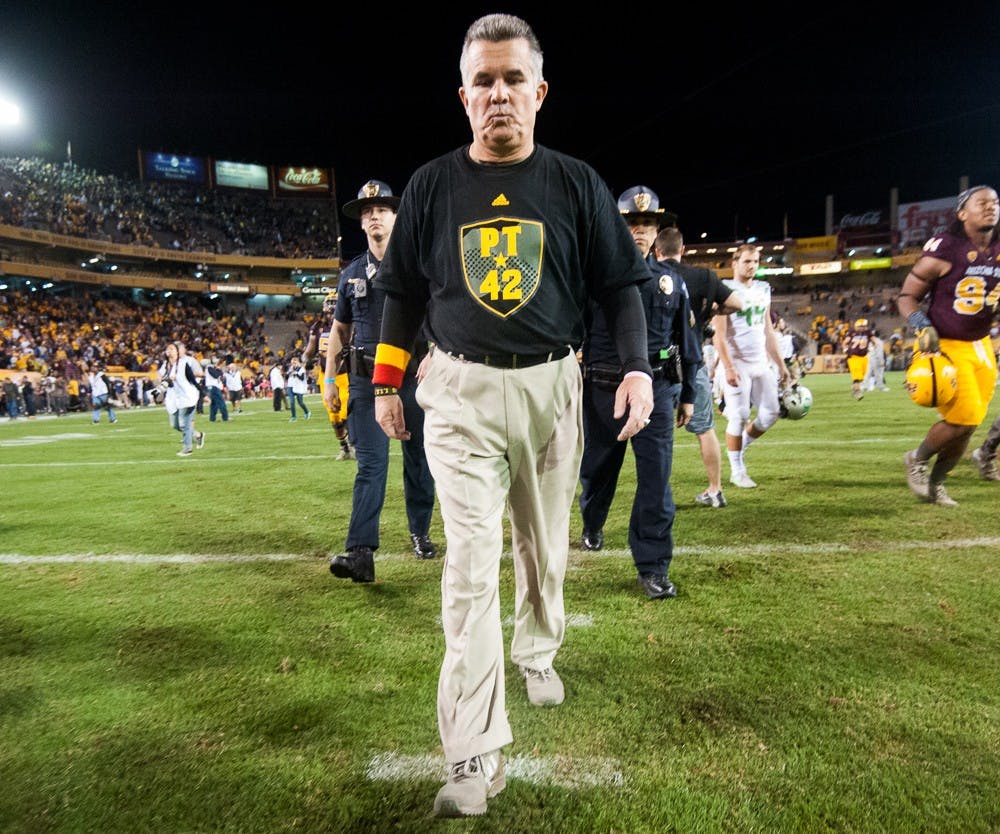Some rules are written and others aren’t. Breaking written rules often leads to formal discipline while upsetting the unspoken ones can start trouble in the court of public opinion.
On Monday, ASU football was accused by another Pac-12 school of breaking an unwritten rule: stealing signs. ASU coach Todd Graham admitted to stealing signs on Tuesday, using the the defense of everybody does it. And if it's so widespread, what's the big deal?
Graham admitted that his staff steals signals just like every team they face does. "There is no illegal about that."
— Devils Digest (@DevilsDigest) November 3, 2015
Given that teams are less reliant on huddling up, play calls often come from the sideline. If opposing players are looking to their coaches for the plays, nothing's stopping ASU from taking a peek.
NCAA rules state that "any attempt to record, either through audio or video means, any signals given by an opposing player, coach or other team personnel is prohibited." It doesn't say anything about other methods, such as using 20/20 vision to see across the field or to use binoculars from the press box.
So in one method, signal-stealing is allowed, and in another, it isn't.
In the accounting profession, the substance over form principle states that "financial statements and disclosures should reflect the underlying realities of accounting transactions." Relating this back to football, even though not every method of stealing signs is against the rules, the substance of the action says that it wouldn't pass the test.
Some call stealing signs gamesmanship, a gray area, but who are we kidding here? This is blatant cheating. The intent is to gain an unfair advantage over the opponent.
The cheating is not just obvious, it's pervasive. According to the Utah quarterback Travis Wilson, ASU defenders were looking to Utah sideline to see the signals. Utah center Siaosi Aiono also told the Salt Lake Tribune that ASU called out some of the Utah's plays during the 2014 game.
Do you think ASU players are just doing this on their own? Of course not, they are getting instructed by their coaches.
On Thursday, Oregon took drastic measures to ensure its plays would not be intercepted – it held up five giant white sheets to block the view. It's unclear how this tactic allows Oregon to see the plays but not ASU. However, it seems like this will be a constant game of cat and mouse if ASU is as dedicated to stealing signs as others allege.
Oregon offensive coordinator Scott Frost told local media that ASU “diligently” steals signs to let the defensive play caller know whether the upcoming play would be run or pass.
“From the intel we got, I've never heard of a team going to the lengths they go to try to get the signals,” he said.
Washington State coach Mike Leach wants the Pac-12 to investigate.
“I mean, you’ve got two straight schools with concerns over it, back-to-back and they have a reputation for it that extends beyond that," Leach said. "The conference probably ought to investigate them and see what they’re doing, make sure nothing is illegal.”
The first time the sign-stealing accusation came to public light was after the aforementioned ASU–Utah game, a pivotal division showdown in which the Sun Devils led entering the fourth quarter. Utah suspected ASU knew what play they were going to run, and according to the Salt Lake Tribune, that's why the team elected to huddle in the fourth quarter (Utah outscored ASU 20-0).
How about instead of trying to read lips and hand signals, teams spend more effort in preparation, study the opposition's trends and formations?
Related Links:
ASU football's Todd Graham addresses cheating allegations
ASU football looking for bounce-back win vs. Washington State
Reach the columnist at jmjanss1@asu.edu or follow @jjanssen11 on Twitter.
Like State Press Sports on Facebook and follow @statepresssport on Twitter.




